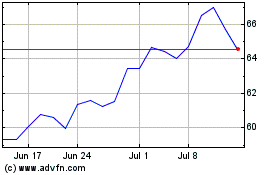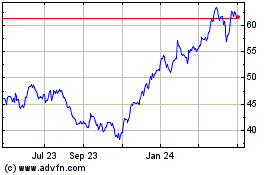By Emily Glazer and Christina Rexrode
This article is being republished as part of our daily
reproduction of WSJ.com articles that also appeared in the U.S.
print edition of The Wall Street Journal (July 14, 2018).
JPMorgan Chase & Co. and Citigroup Inc. posted double-digit
profit increases in the second quarter as businesses and consumers
showed confidence in stronger economic growth by borrowing more,
although investors remained wary in the face of trade conflicts and
interest-rate uncertainty.
The performance of the two banks reflected continued employment
gains in the U.S., a boom in deal-making among companies and
increasing investment by businesses flush with more cash following
the recent tax-code overhaul.
JPMorgan Chief James Dimon said the economy was charging ahead
on most fronts, bolstering banks. "If you're looking for potholes
out there, there are not a lot of things," he said.
Trade and tariff disputes hadn't put a damper on results,
either. While customers at the two banks, whose businesses span the
globe, were worried, Mr. Dimon said that so far this was "affecting
psyches more than economics."
Investors, however, weren't swayed. After ramping up bank shares
following Donald Trump's election, Wall Street has grown cautious
on big banks this year due to a stall in long-term interest rates
that can weigh on profits and which many view as signaling an
increasingly greater possibility of a recession.
A growing divergence in the economic performance of the U.S. and
the rest of the world has also weighed on bank shares.
And while JPMorgan and Citigroup beat estimates, Wells Fargo
& Co. stumbled. The bank had a number of one-time charges that
dinged earnings, but also reported a shrinking loan book and lower
fees in several of its main businesses.
JPMorgan's stock fell slightly during the day, while shares of
Citigroup and Wells Fargo each fell more than 1%.
Gary Bradshaw, a portfolio manager at Dallas-based investment
firm Hodges Capital Management, said the results from JPMorgan and
Citigroup looked solid but concerns about profit margins might have
weighed on their stocks. Hodges owns about $950,000 of Citigroup
shares and about $600,000 of JPMorgan stock in its blue chip equity
income fund, Mr. Bradshaw said.
JPMorgan reported profit of $8.3 billion, up 18% from a year
earlier, and earnings of $2.29 a share, topping expectations of
$2.22 among analysts polled by Thomson Reuters. Citigroup's profit
rose 16% to $4.5 billion from a year ago, a result that also topped
forecasts. Earnings per share of $1.63 beat analyst estimates of
$1.56.
Income at both banks continued to benefit from last year's
tax-law changes that slashed the corporate rate. JPMorgan's
effective tax rate fell to 21% from 28% a year ago, Citigroup's
rate of 24% was down from 32%.
The banks' results were buoyed, in part, by loan growth, which
is a major factor in profitability. Business lending in particular
has begun ticking up after a decline that began in 2016.
At Citigroup, total loans rose 4%, driven by an increase in
corporate loans. Total loans also rose 4% at JPMorgan, where
Finance Chief Marianne Lake said it was fueled by busy capital
markets, especially in mergers and acquisitions.
JPMorgan showed strength in several other areas. Its trading
revenue increased 13% to $5.4 billion from $4.8 billion a year
earlier. Fixed-income revenue rose 7% to $3.45 billion. Excluding
the impact of U.S. tax changes, the bank said its trading revenue
would have risen 16% and fixed income would have risen 12%.
Return on equity, a measure of profitability, was 14% in the
second quarter compared with 12% a year ago. Its returns in 2018
have been meaningfully higher than in previous years thanks to the
benefits of the tax-code overhaul.
One weak area: home lending. JPMorgan extended $21.5 billion in
mortgages in the quarter, a decrease of 10% from the $23.9 billion
the bank extended in the second quarter a year ago. Revenue in its
mortgage division, one of the largest in the U.S. by volume, was
$1.35 billion, down 6% from the $1.43 billion it reported in the
year-earlier period.
Wells Fargo, which is one of the biggest players in the mortgage
market along with JPMorgan, saw a similar decline. Its mortgage
business earned $770 million in the second quarter, down a third
from a year earlier.
Citigroup's results were more mixed than JPMorgan's.
Second-quarter trading revenue fell about 1% from a year ago, to
$3.94 billion, driven by a 6% decline in fixed-income trading.
Citigroup's return on equity improved to 9.2%, from 6.8% a year
ago. But that is still below the bank's theoretical cost of capital
of about 10%.
Lackluster returns at Citigroup are one reason its stock has
struggled this year, losing about 10%. Another issue is that
Citigroup is viewed by many investors as being among the most
internationally oriented of U.S. banks and has a large operation in
Mexico. This quarter, however, profit and revenue were up in
Citigroup's consumer bank in Mexico.
Some investors fear Citigroup could be particularly exposed if
trade disputes led to a meaningful downturn in cross-border
activity, or if negotiations over the North American Free Trade
Agreement broke down completely.
For now, Citigroup executives expressed confidence the bank
would fare well even if there is a chill in U.S. trade. Citigroup
finance chief John Gerspach said the bank has seen a big pickup in
trade flowing between Asian countries. The bank's treasury and
trade solutions unit, which does back-office work for governments
and companies that operate in multiple countries, grew revenue
11%.
PNC Financial Services Group Inc. also reported
higher-than-expected earnings Friday, driven in part by loan growth
in both commercial and consumer lending.
"The consumer is healthy, the housing market is good, corporates
are active," said CEO Bill Demchak. "Things feel pretty good,
almost really good."
Write to Emily Glazer at emily.glazer@wsj.com and Christina
Rexrode at christina.rexrode@wsj.com
(END) Dow Jones Newswires
July 14, 2018 02:47 ET (06:47 GMT)
Copyright (c) 2018 Dow Jones & Company, Inc.
Citigroup (NYSE:C)
Historical Stock Chart
From Mar 2024 to Apr 2024

Citigroup (NYSE:C)
Historical Stock Chart
From Apr 2023 to Apr 2024
